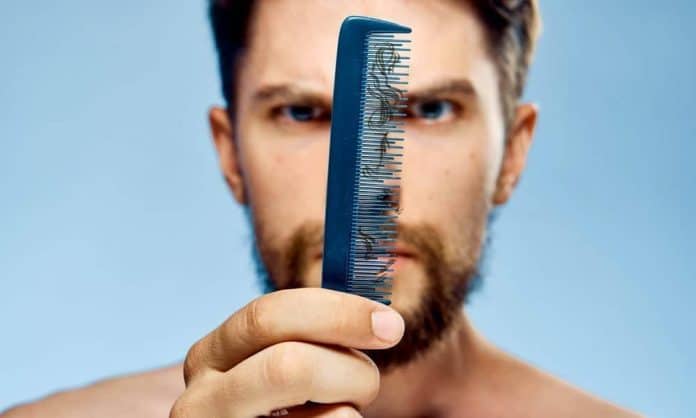
There are many reasons a man can start suffering from beard loss, and I’m not talking about those patchy bearded men who struggle to grow theirs, but guys who had some facial hair, and are now seeing it thinning out.
So what exactly is going on here? Why are you losing beard hairs?
Maybe because of medical reason, natural shedding, some hormonal anomalies, stress, or just poor nutrition habits?
On this article, we will be digging deep to figure out the six possible causes of facial hair loss, along with some really helpful remedies to stop the beard from thinning and return to its former glory.
Quick facts:
- You shed some facial hair daily due to the natural beard growth cycle.
- Beard growth is fueled by male hormones, lower levels may cause beard loss.
- Getting too little vitamins and minerals can cause some beard shedding.
- Both the scalp-hair and facial hair can be lost due to chronic stress.
- Too aggressively taking care of your beard can end up damaging it.
- There’s a medical condition called alopecia areata which causes beard loss.
6 Reasons your Beard May Shed
1. It May Just be Part of the Natural Facial Hair Growth Cycle

In short, the phases are these:
- The anagen growth phase, lasting 2-6 years.
- Catagen transition phase, lasting 1-2 weeks.
- Telogen resting phase, lasting 2-4 months.
- And then the follicle does the same all over again.
Because of this, you will naturally shed a lot of beard hairs on a daily basis, and you are not actually losing these hairs either.
Your body just churns through its natural beard growth stages.
The old hairs are simply being pushed out after the telogen resting phase ends, and the hair follicles return back to the anagen growth phase, producing new hair strand through the same “tube”.
On average, a thick full beard holds about 30,000 hairs, and as part of natural shedding, it’s not uncommon for you to see 50-150 beard hairs falling off in a day.
At each given time, about 10% of your beard whiskers will be in the telogen resting phase, just waiting to drop off so the follicle can sprout new hair from the same tube once it returns to the anagen phase.
Because of this, the odd beard hairs in your sink or your beard combs and beard brushes are not always a sign that you would be suffering from real beard hair loss.
Instead, you should be paying close attention to your beard as is, does it look much thinner, are there noticeable new bald spots?
2. Your Testosterone and DHT Might be Dropping
It’s not a big secret that facial hair growth is triggered and regulated by androgenic male hormones.
More specifically, testosterone primes the follicles for growth; increasing their size, while a hormone called DHT fuels the linear growth1.
Men who have lower levels of androgenic hormones, can’t really grow a beard, and women who have abnormally high levels of androgens due to PCOS for example, will start seeing beard growth on their faces (hirsutism).
If you had a full thick beard naturally, chances are that when the beard developed and grew on your face, you had fairly high levels of androgenic hormones.
If you suddenly start seeing your facial hair falling off and significantly thinning, then it is possible that your testosterone and DHT levels might be falling.
Small fluctuations in these hormones don’t really cause facial hair loss, and it’s common to gradually lose some of your testosterone as you age, but if your levels dip down low enough, it’s likely that your beard hairs will start shedding at a much faster and more noticeable rate.
3. Micronutrient Deficiencies & Aggressive Dieting

This is especially true for certain B-vitamins that have critical parts in the production of keratin and collagen, like biotin for example.
But the effect is not limited to biotin, many other micronutrients like vitamin D, zinc, magnesium, calcium, vitamin A, vitamin K2, and vitamin E play big roles in your endocrine functions and the enzymatic conversions that the beard hair follicles need to operate at full capacity.
Because of that, it’s not a bad idea to supplement with a high-quality multivitamin and to consume a diet that is filled with a wide variety of nutritious foods, without omitting any larger macronutrient groups (fat, carb, protein).
To help you choose the best beard vitamins and optimize your diet as well, check out the following posts…
Aside from vitamin and mineral deficiencies, too aggressive dieting can also result in some facial hair loss.
Simply put, when you cut your caloric intake too much, you will be limiting the available energy your body has for maintenance of its natural processes.
One of the first ones to slow down in a calorie deficit is the endocrine system, and with that, you will usually see testosterone and DHT levels taking a dip2, causing some beard thinning if the diet is kept up long enough.
4. Chronic and Prolonged Stress

Many of these negative effects can be attributed to the elevated levels of the stress hormone; cortisol.
Cortisol rises in response to stress and when kept high enough for a long time, it can wreak absolute havoc within the body.
When it comes to losing your beard hairs, cortisol can also speed that up.
Here are some reasons why it happens…
- Cortisol promotes something called Telogen Effluvium3, which disrupts the natural hair follicle growth phase, and switches more and more beard hairs into the resting phase.
- Cortisol suppresses androgenic hormones4; testosterone and DHT. Partly because of cortisol “battling” for the same raw material, but also through other mechanisms and direct suppression.
- Cortisol induces androgen receptor downregulation5. And androgen receptors are the crucial gate-keepers that allow T & DHT to bind into the beard follicle cells in order to enter DNA.
I’m not qualified to give any stress reduction advice, and I know that it doesn’t help at all to say nonsense like “just don’t think about it”, etc. but know that during stress, at least the antioxidants vitamin C and vitamin E have shown to help suppress some of that elevated cortisol and the damage it causes.
5. Too Aggressive Beard Care Routine

In the case of beard care, it’s easy to “do too much” and end up damaging the facial hair in the process.
For instance, using a boar bristle beard brush can often benefit the beard and even stimulate the growth, but brushing too aggressively, too often, or immediately after the shower, is guaranteed route to a thinning beard.
On top of this, washing the beard too often can make the skin underneath it dry and brittle, damaging the facial hair over time. Some experts claim that the healthiest beard is the 3-day beard, so washing it just a couple of times per week isn’t a bad idea at all.
(and please, use a proper beard shampoo, not the scalp-hair kind).
Many beard heat tools like heated beard brushes and blow-drying the beard can also cause damage to the beard by drying up the outermost cuticle of the hair fibers and literally boiling some of the water trapped inside the facial hair cortex.
Lastly, many beard products like beard oils and balms, use ingredients that are known as DHT-blockers. Thinking you’re “nourishing” the beard and dousing your face with these, can end up accidentally thinning the facial hair instead.
6. Facial Alopecia Aerata & Alopecia Barbae

This results in round bald patches in various parts of the body, and the condition impacts about 2% of the population at some point in their lives.
When this happens in the facial hair area, it’s often called either alopecia areata barbae or alopecia barbae.
Like with many autoimmune diseases, the treatment is difficult, and a full understanding of the causes are not well understood.
In some cases, alopecia lasts through the lifetime, but in others, it can come and go in waves.
Most commonly, alopecia is treated with corticosteroid injections or cream. And some evidence suggests that removing gluten from the diet can help in the normalization of the immune response6.
Minoxidil – the most potent hair and beard growing agent currently known – also provides help for some people depending on the severity of the autoimmune response.
Conclusion
Losing beard hair can be part of the natural shift in the hair follicle growth phase, or caused by issues like poor micronutrient intake, low-calorie dieting, suppressed androgens, too aggressive beard care routine, or alopecia barbae.
We hope our article helped you in understanding what causes beard hair loss and how to mitigate it.
Thank you for reading.
You Might Also Like
- How to Make Your Beard Soft and Smooth Naturally & Effectively
- 5 Ways to Prevent Ingrown Beard Hair (Causes & Treatment)
- How to Get Rid of Beard Itch in 5 Simple Steps
- Beard Dandruff: What is it, What Causes it, & 7 Ways to Get Rid of it












